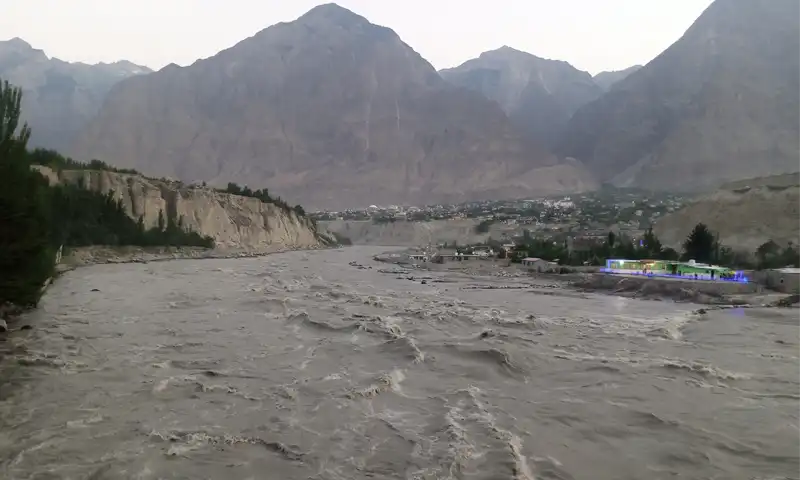- Web Desk
- Feb 24, 2026
Gilgit-Baltistan glaciers melting fast due to persistent heatwaves
-

- Tanveer Abbas
- Jun 30, 2025

GILGIT: Persistent high temperatures in Gilgit-Baltistan have caused rapid melting of glaciers, leading to increased water levels in rivers and streams, flash floods, and landslides.
Gilgit-Baltistan is home to over 13,000 glaciers, more than any other region in the world outside the polar regions. These glaciers are a vital source of fresh water, supplying approximately 70% of Pakistan’s fresh water, which flows into rivers, providing drinking water, supporting ecological habitats, facilitating agricultural activities, and generating electricity. However, recent heatwaves are causing the glaciers to melt at an accelerated rate.
Melting glaciers wreaking havoc
The rising glacier melt has led to higher water levels in rivers and streams across Gilgit-Baltistan, resulting in flash floods, landslides, and mudslides that cause significant land erosion. The increased glacial melt has also impacted agricultural lands, power supply systems, and water distribution channels in various areas of the region.
A sudden flood in the Bulchi area of Bagrot Valley in Gilgit on Monday, wreaked havoc, causing significant damage to local land, crops, and the agricultural system. The flood completely washed away the water channel, disrupting the irrigation system for crops and threatening future agricultural production.
Pakistan rejects Indian move to weaponise water: Dar
Similarly, the rapid melting of the Hopper Glacier has caused destruction in the Nagar Khas locality of Takkar Kot, where homes, crops, hundreds of kanal land, and both fruit-bearing and non-fruit-bearing trees have been wiped out.

Mubarak Hussain, a resident, lost his home and land entirely to the flood, and other residences also sustained severe damage. Victims have appealed to the government of Gilgit-Baltistan and other welfare organizations for immediate protective measures. The district administration has relocated four families.
Former Finance Minister Javed Ali Munwa, along with the Deputy Commissioner of Nagar, conducted a detailed visit to the areas affected by erosion due to the Hopper Glacier’s flow into the river. They assessed the affected areas, listened to public concerns, and issued instructions to provide immediate relief to the victims. They emphasized the importance of emergency safety measures and preparations to address potential hazards.
Climate change in the culprit
Increased water flow and flash floods have disrupted the road links to Upper Tursat and Darkut in Yasin Valley of Ghizer district earlier this week. Similarly, flash floods have also severed the road links between Hyderabad and Karimabad, Hunza.
Passu, Hunza, is facing threats from the flow of the Khunjerab River, which is endangering a section of the strategic Karakoram Highway and some optic fiber infrastructure.

GB Environmental Protection Agency (GBEPA) Director Khadim Hussain attributes this rapid glacier melt to shifting snowfall seasons due to climate change. Previously, the region received snowfall from November to January. However, this year, snowfall occurred in April, and even Babusar received snow in late May.
“This year, snowfall was delayed, which prevented it from converting into ice. With the current heatwaves, the snow is melting at an accelerated rate, leading to high water levels in rivers,” he said.
PDMA warns of dangers posed by rain in Monsoon alert fact sheet
Hussain explained that as this water flows down streams, it causes land erosion and brings boulders and mud, creating a flood-like situation in the rivers. “Overall, due to higher snowmelt, these floods are generated,” he added.




